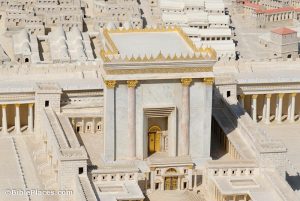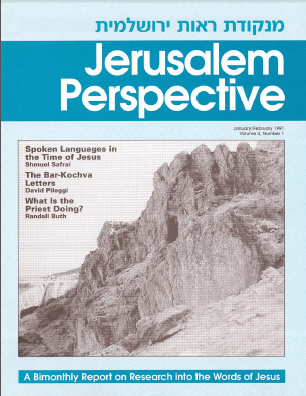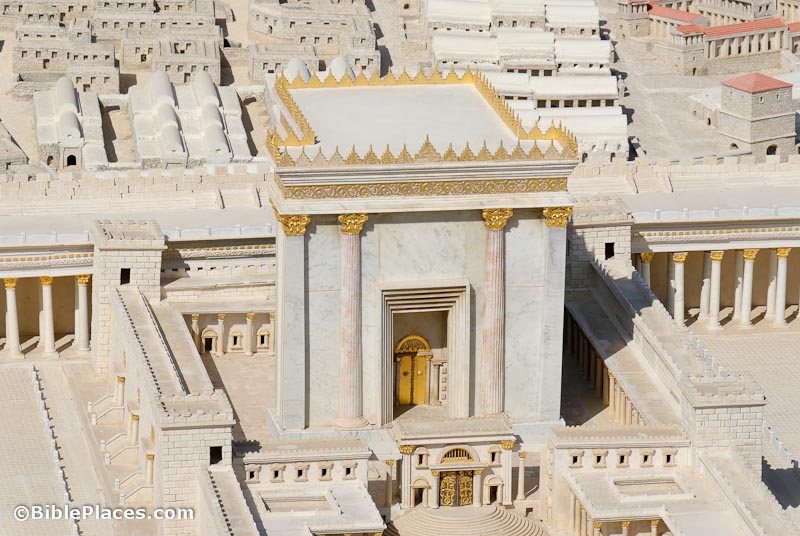How to cite: Randall Buth, “What Is the Priest Doing? Common Sense and Culture,” Jerusalem Perspective 30 (1991): 12-13 [https://www.jerusalemperspective.com/2557/].
מְתֻרְגְּמָן (me⋅tur⋅ge⋅MĀN) is Hebrew for “translator.” The articles in this series illustrate how a knowledge of the Gospels’ Semitic background can provide a deeper understanding of Jesus’ words and influence the translation process. For more articles in this series, click here.

A little story from the birth narratives in Luke shows how our cultural background can create a translation problem.
Luke 1:21-22 in the Revised Standard Version reads:
And the people were waiting for Zechariah, and they wondered at his delay in the temple. And when he came out, he could not speak to them, and they perceived that he had seen a vision in the temple; and he made signs to them and remained dumb.
Common sense is connected to cultural expectations, and what is understandable in one culture is opaque in another. In the story above, it is clear that the people outside the temple understood that Zechariah had had a vision. What is not clear is how they got that information.
Common Sense?
A translator in Africa once suggested to me that Zechariah was using sign language to explain to the people that he had seen a vision. Thus, in the passage above, the clause “and he made signs to them” was the means by which the people learned about the vision. To that translator, the instrumental relationship between the people’s perception and Zechariah’s signs was one of common sense. That, he argued, was the significance of Luke’s “and,” which seems a plausible enough argument considering the influence of Hebrew structures on Luke and the practice of Hebrew simply to use “and” without specifying the exact relationship between two clauses.
One could translate such a relationship in modern English as, “They perceived that he had seen a vision by the signs that he was making….” In more idiomatic English the New International Version suggests this interpretation:
When he came out, he could not speak to them. They realized he had seen a vision in the temple, for he kept making signs to them but remained unable to speak. [emphasis added]
Even more explicit is The Living Bible:
…and they realized from his gestures that he must have seen a vision in the Temple. [emphasis added]
Such an understanding makes sense as it stands, but there is additional cultural information that can change our understanding of the original situation.
More Cultural Background

There was a unique expectation connected to any priest who entered the temple. This was where God placed a special sanctity and was specially present, and people were concerned that nothing should go amiss whenever a priest entered the area. On the Day of Atonement, the high priest, after offering incense in the Holy of Holies, paused for a moment in the sanctuary to pray a short prayer before returning to the courtyard where the assembled people were waiting. The Mishnah states: “He did not make the prayer long so as not to frighten Israel” (m. Yoma 5:1).
The people’s anxiety when a priest remained too long within the sanctuary is illustrated by an incident that happened to a high priest, possibly Shim’on the Righteous, who served as high priest around 200 B.C.:
Once a certain high priest made a long prayer and [his fellow priests] decided to go in after him—they say this high priest was Shim’on the Righteous. They said to him: “Why did you pray so long?”
He said to them: “I was praying that the temple of your God would not be destroyed.”
They said to him: “Even so, you should not have prayed so long.” (Jerusalem Talmud, Yoma 42c)
The People’s Expectation
Luke recounts that “the people wondered at Zechariah’s delay in the temple.” The people’s common sense had already realized that something was amiss, and that for good or bad, there probably was a divine visitation taking place. When Zechariah came out and could not talk, their suspicions were immediately confirmed—the content of Zechariah’s sign language was unnecessary for reaching that conclusion. Luke, in fact, never tells us exactly what Zechariah was trying to say, though we might assume he was not only trying to communicate that there had been a supernatural visitation, but also what the angel had told him, some of the awe and terror that he felt and what he planned to do. Luke’s statement that “he was making signs to them and remained dumb” focuses on the resultant condition of Zechariah.
A culturally more appropriate translation would retain a major break between the people’s perception and Zechariah’s sign making. The Revised Standard Version does this, and the Good News Bible has a good, idiomatic English version of Luke 1:21-22:
In the meantime the people were waiting for Zechariah, wondering why he was spending such a long time in the Temple. When he came out he could not speak to them—and so they knew that he had seen a vision in the Temple. Unable to say a word, he made signs to them with his hands.


































































































Comments 2
Hello Dr. Buth, I have a question about the way in which the speaker in the quote phrases his reply to the questioner.
“He said to them: “I was praying that the temple of your God would not be destroyed.””
Is it common in Hebrew to phrase something as if you were not part of the group you’re addressing? For instance in the above example, the one who replies says, “temple of your God”. This gives us the impression that “your God” is not “my God”. Why not say, “our God”? I’ve noticed this with some of Jesus’ sayings as well, “it says in your law, ‘Ye are gods'”. It gives the english reader the impression that Jesus is somehow distancing himself from ‘the law’. Why wouldn’t he have said, “our law”?
Author
I’ve wondered the same myself, but not addressed it. So here goes.
Some languages divide “we, us, our” into “we exclusive” meaning the audience is not included, and “we inclusive” meaning the audience is included. Luwo, Sudan, was such a language that had separate morphology for we-inclusive and we-exclusive.
So my question, bizarre sounding, is whether a language like Hebrew could develop a default “we exclusive” meaning “we”, without the bifurcation in morphology? If so, that would explain why “you” would be chosen over “we”, because “we” might have implied “we exclusive, not you”. So “you (incomplete set)” was chosen.
One would need to do a survey: how many of the “we” “us” in the gospels are “we-exclusive, not you”, and how many are “we, including you”? If there is a strong enough tendency, that would explain it.